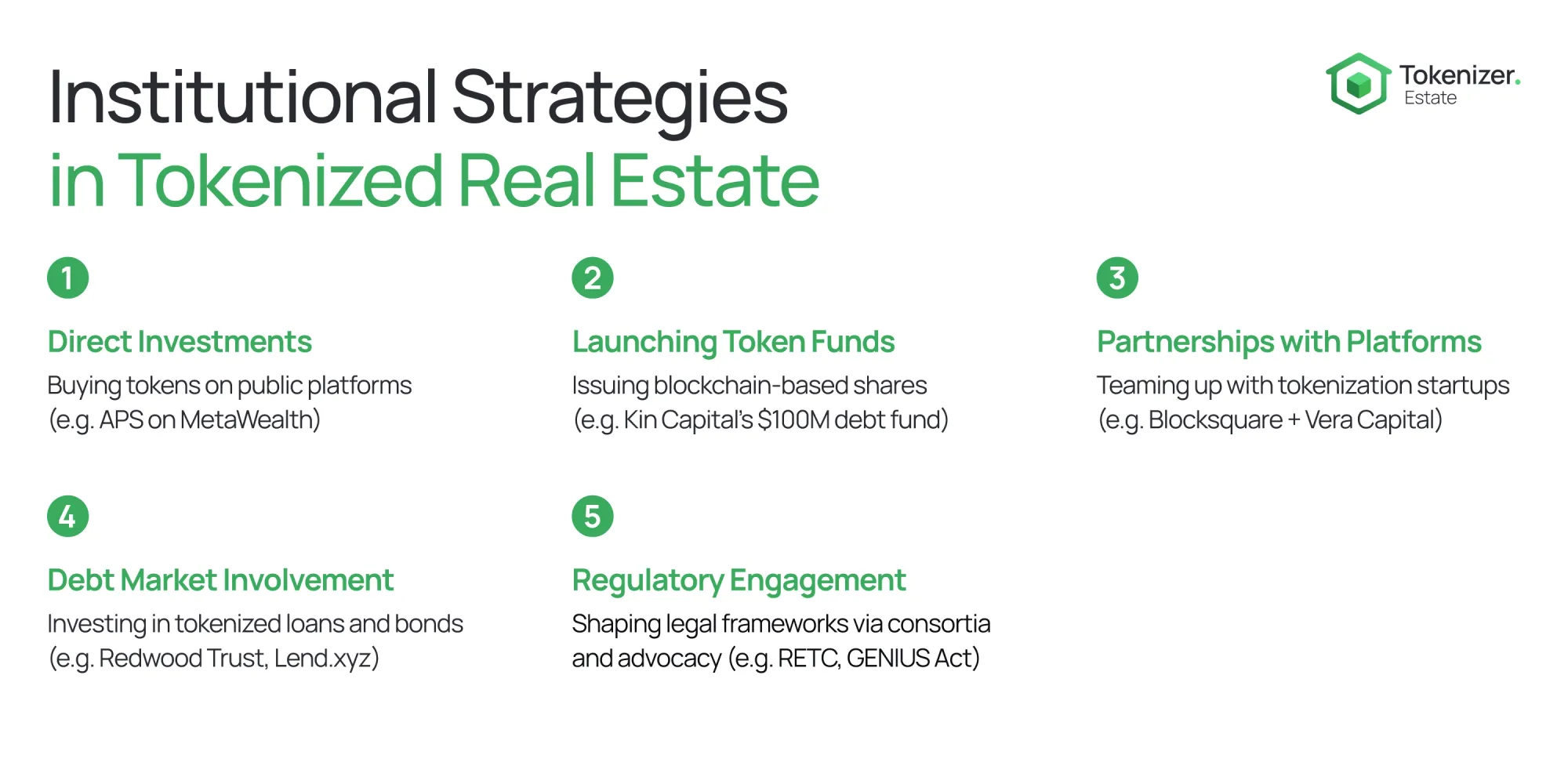How Institutional Investors Are Entering the Tokenized Real Estate Space

Tokenized real estate is the process of converting property ownership into digital tokens on a blockchain. In simple terms, it means breaking a building or land into many small digital shares. Each token represents a fraction of the property and is recorded on a secure ledger. This technology can unlock new markets and make it easier to trade property shares. For example, a Deloitte report notes that tokenization can create new markets and help overcome real-estate problems like slow deals and high fees. Experts predict very large growth: one forecast expects around $4 trillion in real estate to be tokenized by 2035. Industry analysts (e.g. Citibank and BCG) even estimate up to $16 trillion of all assets could be on blockchain by 2030, with real estate a big part of that. These big numbers have caught the attention of many large investors.
Why Institutions Are Interested
Institutional investors (such as pension funds, REITs, and large wealth managers) have clear reasons to look at tokenized real estate. First, tokenization promises more liquidity. By splitting a property into small tokens, investors can buy or sell pieces more easily than a whole building. Tokens can be traded quickly on digital platforms, unlike traditional sales that take months. Second, tokenization lowers the entry barrier. Big assets that once needed millions can be shared so that more investors can join in with smaller sums. In effect, real estate can be treated more like stocks. For example, one survey found many people want easier access to alternative assets like property. Tokenization lets institutions and even retail investors own slices of large projects, making portfolios more diverse.
Institutional funds also see tokenization as a way to create custom portfolios. Deloitte points out that blockchain-based tokens allow fund managers to match investments to their strategy. In other words, a fund could tailor its token holdings by type of property, location, or even sustainability ratings. Tokenization can also embed rules (via smart contracts) to automate actions like rent collection or compliance. This potential for efficiency and innovation attracts institutional players.
Evidence of interest was already clear in earlier surveys. An EY study from 2024 reported that about 32% of institutional investors planned to invest in tokenized real estate by the end of 2024.. (High-net-worth individuals are even more eager, with 65% planning to invest.) Firms expect to devote a small but growing slice of assets to digital tokens. In fact, EY finds institutions expect to put around 5.6% of their portfolios into tokenized assets (all types) by 2026. This shows many big investors are warming up to tokenized property as a new asset class.
Who Is Entering the Tokenized Real Estate Space

Institutional investors themselves are just beginning to make moves in tokenized real estate. Early tokenization deals were often led by crypto startups or wealthy individuals. For example, in 2019 a group of Gulf investors turned a luxury London hotel into $600 million of blockchain tokens. But now large regulated funds and companies are joining in.
In Europe, a landmark event came in mid-2025 when APS, a €12 billion pan-European fund manager, bought tokenized property assets alongside retail buyers. APS purchased about €3 million in tokenized bonds tied to two Italian apartments through the blockchain platform MetaWealth. This was the first known direct institutional purchase of tokenized real estate that ordinary people could also buy. An APS manager said this move shows “tokenisation represents a transformative shift in investing, offering increased liquidity and streamlined transactions”. In other words, even big funds see tokenization as a way to make transactions smoother and open up new sources of liquidity.
Large asset managers are also preparing their own token projects. For instance, BlackRock – the world’s largest asset manager – announced a plan with Securitize to tokenize $10 trillion of its assets, including real estate holdings. With BlackRock managing about $39 billion of real estate directly, tokenizing some of those assets could change how institutional real estate investment works. The announcement itself shows the growing interest: it was reported alongside other big token moves, like a $3 billion Dubai real-estate tokenization deal by MAG and partners.
In Asia, Japan has led the way by developing clear rules and infrastructure for tokenization. Industry analysts note that Japan has seen a surge in real estate token offerings and is now “a global leader in tokenizing real estate”. This regulatory clarity makes it easier for Japanese real-estate companies and funds to issue property tokens. Singapore is also moving cautiously: Singapore’s government supports tokenization, and platforms like Fraxtor (MAS-licensed) allow accredited investors to buy tokenized real estate. For example, one Singapore platform lets users invest $19,500 (about $25,000 S) for shares in overseas developments. These examples show even in Asia many institutional and high-end investors are testing tokenized property deals.
In the United States, activity has been more on infrastructure than on investments so far. A notable U.S. project was Bergen County, New Jersey, which is moving 370,000 property records onto the blockchain. While this is a public-records project (not an investor deal), it builds the tokenization foundation. On the investment side, some U.S. real-estate firms are experimenting. For instance, Redwood Trust (a large mortgage REIT) has used blockchain to share daily payment data on home-loan securitizations. And a company called Kin Capital plans to launch a $100 million tokenized real estate debt fund on a blockchain platform. These moves show U.S. institutions are exploring tokenization in different ways, even if retail offerings remain limited by regulation.
Even in emerging markets, institutions are taking note. In Africa, for example, fintech startup Xend Finance launched the first platform (in Nigeria) to let people invest in tokenized real estate and stocks with as little as $5. Although this is aimed at retail investors, it signals that managers and fintechs see tokenized real estate as a way to open new markets and capital sources. Together, these examples illustrate that institutional players (funds, REITs, government agencies) across the globe are beginning to enter the tokenized real estate space.
Strategies of Institutional Investors

How exactly are institutions getting involved? Some are taking a direct investment approach. The APS fund, for example, simply bought tokens on an open platform (MetaWealth) just like any other investor. This shows one strategy: use existing security-token platforms to acquire property stakes. Other institutions are launching their own token funds or offerings. For instance, specialized real-estate funds may issue blockchain-based shares of their portfolios. Deloitte describes how traditional funds can convert LP interests into tokens that can trade on-chain. A concrete example is Kin Capital’s planned tokenized debt fund, which will be open to qualified institutional buyers on a blockchain network. By creating such token funds, asset managers can tap crypto-minded investors and offer easier trading of fund shares.
Another strategy is partnerships with tokenization platforms. Many real-estate token projects involve alliances between property firms and blockchain companies. For example, the Dubai government has partnered with a blockchain platform (Prypco Mint) to fractionalize local property ownership. Although this is government-driven, it will attract institutional capital by providing a compliant channel. In Europe, property managers are teaming up with token startups (like MetaWealth and Blocksquare) to tokenize assets. The recent news of Blocksquare and Vera Capital planning a $1 billion commercial real estate tokenization shows this trend. In such deals, institutional investors may contribute equity or debt, while token tech firms handle issuance and trading.
Some institutions are focused on lending and debt markets. Tokenization is not only for equity stakes – it can be used on loans. Redwood Trust’s example shows mortgage lenders using blockchain data for securities. In Europe, a startup (Lend.xyz) lets crypto investors fund tokenized property loans and earn 8–15% yields. Pension funds or banks could join such lending platforms to diversify fixed-income portfolios. By buying tokenized real estate debt or bonds, institutions can get exposure to property projects without holding physical assets. This strategy expands the ways institutions can participate beyond just owning property shares.
Finally, many institutional players are working on governance and regulation strategies. Because tokenized real estate is new, much depends on legal clarity. Institutions often form groups or consortia to shape the market. For example, a Real Estate Tokenization Consortium (RETC) was formed by leading firms (including Tokenizer.Estate) to set standards for compliance and interoperability. Advocacy groups push for clearer rules. In the U.S., the GENIUS Act (passing in 2024) was widely seen as “laying the foundation” for tokenized real assets. Institutional leaders also call for official guidance: Robinhood’s crypto chief said a “new regulatory approach is needed” for tokenization to flourish. By engaging with regulators, institutions hope to make tokenized real estate a mainstream, regulated market.
Looking Ahead

Institutional involvement in tokenized real estate is still in early stages, but the momentum is clear. Big funds and companies are starting to dip into this market as forecasts and pilot projects prove the concept. They enter through direct investments, launching blockchain funds, partnering with tech providers, and advocating new rules. In many cases, they team up with crypto-focused startups or industry groups to manage the risks. Experts say that as long as tokenized assets show liquidity and quality, institutions will buy them. For instance, a blockchain analyst noted: “When a proper, high-quality asset is on-chain, people will eat it like hot candy”. In short, once the market proves itself, institutional capital could flow in quickly.
The key challenges remain regulation and market depth. Surveys show nearly half of institutions worry about regulatory uncertaintyey.com. Right now, most tokenized offerings are sold under private rules (only accredited investors). But this is likely to change. With global regulators beginning to act – as in Dubai, Singapore, and the U.S. – more open markets should arrive. Once structures and platforms are in place, institutional investors will have clear paths to participate.
In conclusion, institutional investors are slowly but surely entering the tokenized real estate arena. They are attracted by the promise of liquidity, efficiency, and access to a broader investor base. We have seen early cases of large funds buying tokenized property stakes, and big asset managers preparing token funds. Strategies include co-investing with retail, creating token-based funds, and helping shape the rules of the game. As one report notes, tokenization could “open real estate to a broader audience” and unlock value through liquidity. For institutional investors, tokenized real estate offers a new tool to achieve portfolio goals. The story is just beginning, and the coming years will show how deeply these traditional players dive into the blockchain-powered property market.
Stay informed.
Subscribe to blog.tokenizer.estate for expert insights, real-world case studies, and the latest updates in real estate tokenization 🏠

